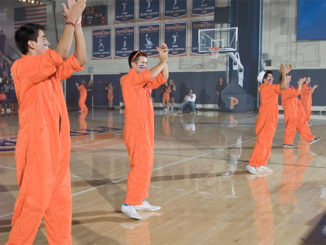
Long hours, draining rehearsals and lots of rejection.
These are a few of the things that Pepperdine theatre majors face each semester. But students said the close-knit community within the theatre department helps to make some of the hardest parts of the major a little more manageable.
Reece McDaniel, a sophomore theatre arts major with an acting emphasis, spoke for many theatre majors when she said auditioning for a role can be nerve-wracking.
“It is quite competitive,” McDaniel said. “Especially as a freshman last year, it’s really competitive and really scary.”
Some theatre majors said that the additional responsibilities required of students on theatre scholarships make auditions even more stressful. Students also said they find being rejected for a role mentally draining, but they appreciate the faculty support and preparation for the real world that the theatre program provides.
Theatre scholarships create additional responsibilities
For students on a scholarship from the Pepperdine Theatre Department, the audition process becomes routine.
Rio Robinson, a sophomore who is double majoring in business and theatre, said students on theatre scholarships have more requirements than other theatre students. The Theatre Department recently offered Robinson a scholarship, and Robinson said she is having difficulty making the decision to take it.
“You have to audition for every single show,” Robinson said. “You cannot miss a single audition.”
If a student on a theatre scholarship does not get cast in a show, they are required to work on the production as a part of the crew. This requirement applies to all four major productions that the theatre department produces each year.
Robinson said the students on scholarships do not have a choice about which part of the crew they will be a part of.
“You have to work as a crew member for every single show,” Robinson said. “You’ll be placed in a position that you have no control over and you will have to work that show.”
Harrison Benjamin, a sophomore theatre arts major with an emphasis in acting, said he is currently working on the crew for Pepperdine’s musical production in a unique position.
“Basically, they have little kids in the show,” Benjamin said, with a smile playing on his face. “I just watch over them, make sure they know what they’re doing.”
How students deal with rejection
Theatre majors experience a fair amount of rejection.
Theatre Professor Cathy Thomas-Grant said auditions at Pepperdine factor in many things, most of which students can’t predict.
“There are things when you walk into an audition that are out of your control,” Thomas-Grant said. “You just prepare the best that you can and give 100%.”
Grant said the results of auditions are not a result of students not putting in work, but rather the director’s vision for the show as a whole.
“The kids are free to come and speak to me about ‘Why didn’t you cast me?” Thomas-Grant said. “A lot of times it has nothing to do with you, it has to do with the whole picture.”
Still, rejection can take a toll on a person’s mental health. Theatre majors said they have developed techniques to deal with rejection in the audition process.
Hannah Sedlacek, a senior musical theatre major, said that for her, not getting cast in a production is a difficult scenario to grapple with.
“It feels really frustrating and it can be very disheartening,” Sedlacek said. “You start going down the road of ‘Am I not good enough?’”
Sedlacek said her strategy to manage cast-list induced stress is by having grace and patience with herself.
“After a cast list comes out, and you’re upset by it, give yourself 24 hours to feel all the things,” Sedlacek said. “To scream, cry, yell, get angry, get upset, and then after those 24 hours pass, take a deep breath and move forward.”
Theatre faculty provides support
Bradley Griffin, divisional dean of Fine Arts and theatre professor, said he can see how auditions can be competitive, but hopes that the faculty and theatre community offer adequate support to minimize the competition and stress.
“I hope that our casting process is not characterized by students feeling like they have to stab each other in the backs in order to get ahead,” Griffin said.
Several students said they felt adequate support from the theatre faculty during the audition process.
Sophomore theatre major Annalia Garrett said the opportunity to talk to theatre faculty about their casting decisions helps her to feel very supported.
“Usually we can ask the faculty for some notes, some feedback of what I did well and what I didn’t do well,” Garrett said. “They’re very open to that kind of stuff.”
Robinson said the faculty isn’t overly supportive, but do prepare students for the real world of auditions. “You just have to, like, roll with the punches. That’s what the industry is,” Robinson said. “Nobody’s ever getting an apology for not getting cast.”

Rehearsing into the night
For theatre majors, the hard work doesn’t stop at auditions.
After the cast list comes out for a production, rehearsals are in session almost immediately. Depending on the production, these rehearsals can be in session for up to three months, and can run as late as 11:00 pm.
McDaniel said his everyday schedule during a show can get hectic.
“You’re in class from 8 or 10 a.m. to 4 or 5 p.m., and then rehearsal from 6:30 to 10:15 p.m.,” McDaniel said.
In addition to rehearsals, theatre majors also have to keep up with their regular schoolwork.
While she enjoyed being a part of a mainstage production, Robinson said it was tricky to balance long rehearsals and academically challenging classes at the same time.
“It was a great experience, I’m really glad I did it,” Robinson said. “It was also very very stressful, especially show week, maintaining going to my 8 a.m. classes even when I had really late shows.”
The theatre department helps students prepare for the real world
Many theatre students agreed that the theatre department at Pepperdine helps them to prepare for auditions in the industry.
McDaniel said the department offers classes that specifically help students develop career skills that apply to real-life auditions.
“It’s sort of the bridge into the real world,” McDaniel said. “They bring agents in, they help you prepare for how to find an agent, how to find auditions.”
One of these classes, Career Skills for the Theatre Practitioner, gives students weekly opportunities to engage in career opportunities appropriate for their area of study, according to the Seaver College Academic Catalog.
Sedlacek said that while the theatre department does their best to prepare them for the industry, the auditions aren’t as stressful as they are in the real world.
“Pepperdine auditions are a lot more manageable than outside auditions,” Sedlacek said.
Sedlacek said the theatre department primarily helps students with building confidence and talent in their respective areas of practice.
“You get your skill set really refined at Pepperdine, so that when you are auditioning, you have those things to fall back on,” Sedlacek said.
Niccie Jamitkowski completed the reporting for this story in Jour 241 under the supervision of Dr. Christina Littlefield and Dr. Theresa de los Santos. Dr. Littlefield supervised the web version of the story.



